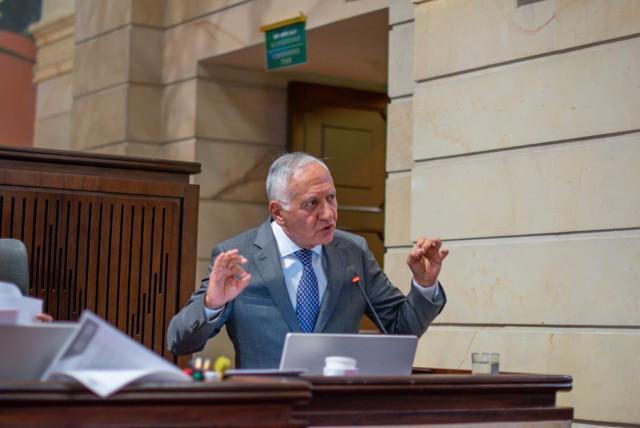BTN News: In 2024, Colombia’s healthcare sector is facing an unprecedented financial crisis. The lack of resources to fund critical services for chronic diseases and high-cost treatments has left over 1.3 million patients at risk. These treatments, essential for managing conditions like polyarthritis, chronic kidney disease, and HIV, are no longer guaranteed as the government struggles to secure funding. The healthcare system’s financial shortfall became more evident after Acemi, the association representing Colombia’s health insurance companies (EPS), raised alarms in early September. The situation poses a serious threat to ongoing treatments, as the Ministry of Health and the Ministry of Finance have yet to disburse funds for the second half of 2024.
Alarming Shortfall in Colombia’s Healthcare Funding
Budget Gaps for High-Cost Treatments Could Affect Over 1.3 Million Patients
As of September 2024, Colombia’s government is grappling with a severe shortage of resources allocated for Maximum Budgets, the funds designated for services not covered by the Plan de Beneficios en Salud (PBS), Colombia’s basic health benefits plan. These budgets typically cover the costs of expensive medications and treatments, particularly for chronic illnesses like chronic kidney disease, polyarthritis, and obesity, as well as non-medical services such as transportation for patients and nutritional supplements.
The Ministry of Health confirmed that payments for these treatments have only been covered up until June 2024. Payments for July through September remain in limbo, awaiting funds from the Ministry of Finance. Without immediate government intervention, 1.35 million Colombians may experience interrupted treatments, which could have life-threatening consequences.
Chronic Disease Patients at the Forefront of the Crisis
Patients with Pain, Obesity, and Polyarthritis Among the Most Affected
According to Acemi, chronic diseases account for the majority of non-PBS prescriptions. Conditions such as chronic pain, obesity, and polyarthritis make up a substantial portion of these cases. The demand for non-PBS medications has risen by 36% between 2022 and 2024, putting further strain on already limited resources.
In 2023 alone, ten high-cost medications, prescribed through the Mipres system (a digital tool for requesting non-PBS services), accounted for nearly 60% of all non-PBS prescriptions. This spike in demand for expensive drugs and services highlights the critical need for a more sustainable healthcare funding model.
Government Delays and Fiscal Constraints
Ministry of Finance Blames Fiscal Challenges for Payment Delays
The Ministry of Finance has pointed to the country’s fiscal challenges and fluctuating tax revenue as key factors behind the delayed payments. The ministry acknowledged that the disbursement of funds for Maximum Budgets—essential for non-PBS treatments—depends on the nation’s evolving financial situation.
This uncertainty is particularly concerning for patients requiring continuous care. Many fear that without a swift resolution, the most vulnerable patients could face disrupted treatments, potentially worsening their health outcomes.
Essential Services Beyond Medications Also at Risk
Non-Medical Support Like Transportation and Nutritional Supplements Facing Cuts
Beyond medications, complementary services such as patient transport, diapers for those with incontinence, and nutritional supplements have been critical for many Colombian patients. In 2023, these services made up 30.6% of all non-PBS prescriptions, according to Acemi.
One of the most frequently prescribed non-medical services is transportation—covering taxi fares, inter-municipal transport, and flights for patients and their caregivers. These services ensure that individuals, particularly in rural or remote areas, can access essential medical treatments. If these services are cut due to budget shortfalls, many patients could face insurmountable barriers to receiving care.
Will Colombia’s Healthcare Crisis Be Resolved?
Calls for Government Action as Healthcare Providers Struggle to Maintain Services
The current crisis has prompted urgent calls for action from both healthcare providers and patients alike. Acemi has repeatedly urged the government to prioritize healthcare funding, emphasizing that further delays will only exacerbate the growing crisis.
While the Ministry of Health has recognized the severity of the issue, officials have yet to confirm when the necessary funds will be allocated. As patients wait for clarity, the clock is ticking for over a million Colombians who depend on these services to manage their health conditions.
Conclusion: A Call for Urgent Solutions
The financial crisis in Colombia’s healthcare sector is not just a budgetary concern—it’s a matter of life and death for many. Chronic disease patients, particularly those reliant on non-PBS treatments, are facing the greatest risks as government delays threaten to cut off their access to essential care. As the country’s fiscal challenges continue, finding a sustainable solution to this healthcare funding gap has never been more urgent. Without immediate action, the repercussions could be catastrophic for millions of Colombians.


